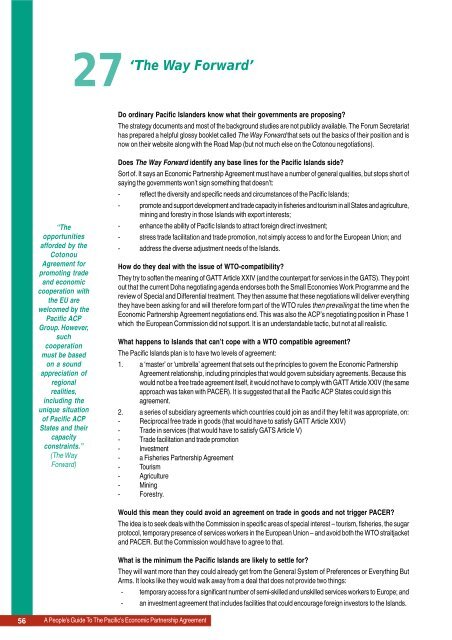REPA Booklet - Stop Epa
REPA Booklet - Stop Epa
REPA Booklet - Stop Epa
Create successful ePaper yourself
Turn your PDF publications into a flip-book with our unique Google optimized e-Paper software.
27<br />
‘The Way Forward’<br />
Do ordinary Pacific Islanders know what their governments are proposing?<br />
The strategy documents and most of the background studies are not publicly available. The Forum Secretariat<br />
has prepared a helpful glossy booklet called The Way Forward that sets out the basics of their position and is<br />
now on their website along with the Road Map (but not much else on the Cotonou negotiations).<br />
“The<br />
opportunities<br />
afforded by the<br />
Cotonou<br />
Agreement for<br />
promoting trade<br />
and economic<br />
cooperation with<br />
the EU are<br />
welcomed by the<br />
Pacific ACP<br />
Group. However,<br />
such<br />
cooperation<br />
must be based<br />
on a sound<br />
appreciation of<br />
regional<br />
realities,<br />
including the<br />
unique situation<br />
of Pacific ACP<br />
States and their<br />
capacity<br />
constraints.”<br />
(The Way<br />
Forward)<br />
Does The Way Forward identify any base lines for the Pacific Islands side?<br />
Sort of. It says an Economic Partnership Agreement must have a number of general qualities, but stops short of<br />
saying the governments won’t sign something that doesn’t:<br />
- reflect the diversity and specific needs and circumstances of the Pacific Islands;<br />
- promote and support development and trade capacity in fisheries and tourism in all States and agriculture,<br />
mining and forestry in those Islands with export interests;<br />
- enhance the ability of Pacific Islands to attract foreign direct investment;<br />
- stress trade facilitation and trade promotion, not simply access to and for the European Union; and<br />
- address the diverse adjustment needs of the Islands.<br />
How do they deal with the issue of WTO-compatibility?<br />
They try to soften the meaning of GATT Article XXIV (and the counterpart for services in the GATS). They point<br />
out that the current Doha negotiating agenda endorses both the Small Economies Work Programme and the<br />
review of Special and Differential treatment. They then assume that these negotiations will deliver everything<br />
they have been asking for and will therefore form part of the WTO rules then prevailing at the time when the<br />
Economic Partnership Agreement negotiations end. This was also the ACP’s negotiating position in Phase 1<br />
which the European Commission did not support. It is an understandable tactic, but not at all realistic.<br />
What happens to Islands that can’t cope with a WTO compatible agreement?<br />
The Pacific Islands plan is to have two levels of agreement:<br />
1. a ‘master’ or ‘umbrella’ agreement that sets out the principles to govern the Economic Partnership<br />
Agreement relationship, including principles that would govern subsidiary agreements. Because this<br />
would not be a free trade agreement itself, it would not have to comply with GATT Article XXIV (the same<br />
approach was taken with PACER). It is suggested that all the Pacific ACP States could sign this<br />
agreement.<br />
2. a series of subsidiary agreements which countries could join as and if they felt it was appropriate, on:<br />
- Reciprocal free trade in goods (that would have to satisfy GATT Article XXIV)<br />
- Trade in services (that would have to satisfy GATS Article V)<br />
- Trade facilitation and trade promotion<br />
- Investment<br />
- a Fisheries Partnership Agreement<br />
- Tourism<br />
- Agriculture<br />
- Mining<br />
- Forestry.<br />
Would this mean they could avoid an agreement on trade in goods and not trigger PACER?<br />
The idea is to seek deals with the Commission in specific areas of special interest – tourism, fisheries, the sugar<br />
protocol, temporary presence of services workers in the European Union – and avoid both the WTO straitjacket<br />
and PACER. But the Commission would have to agree to that.<br />
What is the minimum the Pacific Islands are likely to settle for?<br />
They will want more than they could already get from the General System of Preferences or Everything But<br />
Arms. It looks like they would walk away from a deal that does not provide two things:<br />
- temporary access for a significant number of semi-skilled and unskilled services workers to Europe; and<br />
- an investment agreement that includes facilities that could encourage foreign investors to the Islands.<br />
56<br />
A People’s Guide To The Pacific’s Economic Partnership Agreement
















